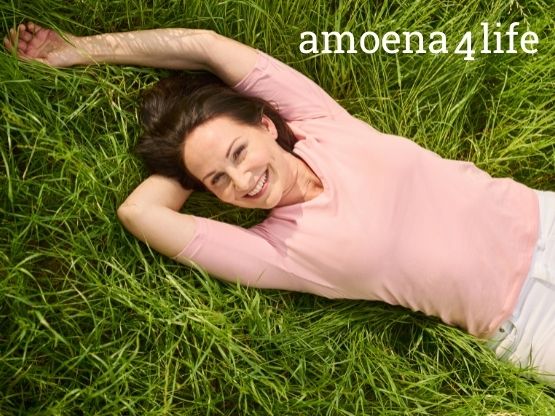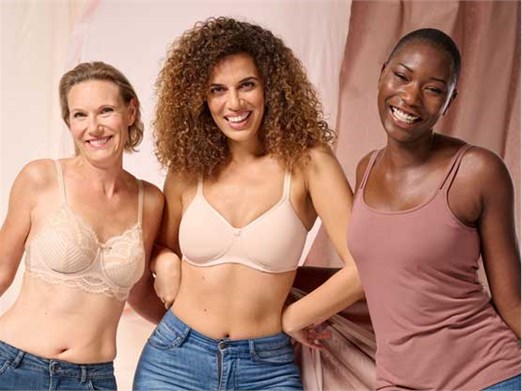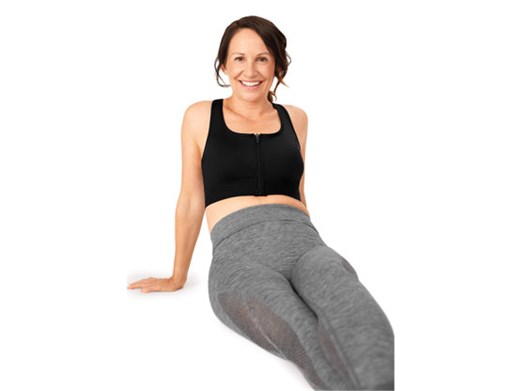Kate's story
Darwin based, mum of three Kate shares her story about living with metastatic breast cancer

As told to Heidi from Amoena Australia.
Heidi: Can you start by telling us about yourself?
Kate: I am Kate Hardman, I am 39 and I live in Darwin NT.
Originally from the UK, we came here in 2014 and I have metastatic breast cancer.
I was initially diagnosed with breast cancer in 2017. I had a mastectomy [on the left breast] and some radiotherapy.
When I was 22 weeks pregnant in February 2023, I had a bilateral reoccurrence. I had a mastectomy on the right breast and a further, wider incision on the left and some chemotherapy. I started my chemotherapy treatment and as that was occurring, the cancer spread to my neck, breaking the bone in my neck.
I was care flighted to Brisbane to have surgery on my neck and came home, had my baby and she was all healthy at 35 weeks. I had then had radiotherapy on my neck.
Heidi: If we rewind back to who Kate was in 2016, what would you say to yourself before you were diagnosed?
Kate: To be more aware, more open minded that these things can happen. At that age, having a young baby, you think you're invincible.
I think for me it's not to be naïve. These things can happen so check more. I never did breast checks and so it would to be more aware of your body. Know what normal is for you, be healthy. I would never want her to be worried that this would happen, but just be open minded. It doesn't just happen to older people.
Heidi: That's a big misconception with breast cancer: that it only happens older women. Have you found that people have misconceptions about what metastatic breast cancer is and what it means for your life?
Kate: The biggest one for me, was the misconception that I'm going to be cured.(People assume) I've got metastatic breast cancer, that I'll be treated and everything will be fine. We've had some tough conversations with my immediate family. With my mum and dad, they were under the impression that you've got it, you've had surgery, treatment, you're done. But we had to explain that's not how it works. This is here, this is incurable, but we're treating it. Hopefully the treatment will last a long time.
I suppose that's the biggest misconception for me is that, they think, you'll be OK, which hopefully, for a while I will be.
Secondly is because the cancer went to my neck, people assume I've got bone cancer and you're like, no, I've got metastatic breast cancer. Yes, the cancer went to my bone and broke that bone, but I don't have bone cancer.
So you have that explanation as well. They're the main two misconceptions.
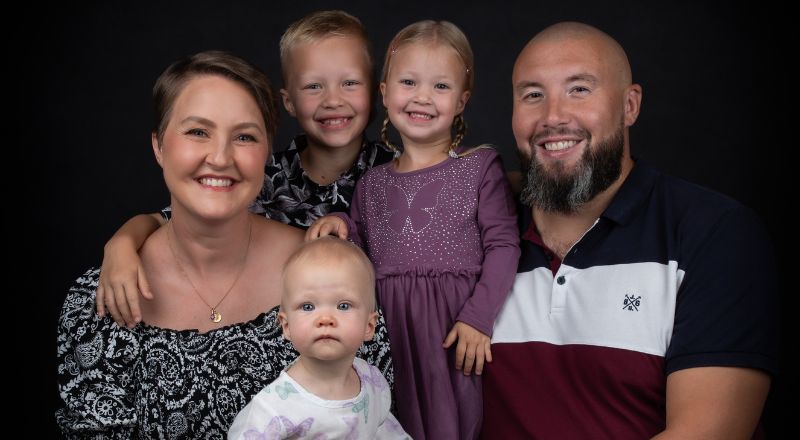
Heidi: You and your husband have decided to share both of your stories (Kriss was diagnosed with testicular cancer in 2020) via The Hardmans social media accounts with your motto strength in adversity. What does strength look like for you?
Kate: Strength comes in all forms, but I find it's my mindset, it's my drive and it's my resilience to get through the really hard times and there have been a lot of them. When you get knocked down time and time again, to be able to pick yourself back up. To want to carry on that fight. That's what I see as strength. That's what I draw my strength from. I also draw it from my family and friends. They helped me build my inner strength to be able to deal with these with things that life throws at you, all these obstacles.
Heidi: What gives you strength on your challenging days?
Kate: 100% it's my family. If I'm having a bad day, I’ll talk to Kriss, he's really good at grounding me, rationalising, giving me focus and to be able to move forward from that. He's really good at supporting and letting me have my moment, whether that's crying, shouting or whatever. Once I've done that, then we move forward together. The kids are everything, what you live for.
Heidi: You've got three young kids, have they had questions about your health, diagnosis, or treatment?
Kate: Myself and Kriss wanted not to traumatise the children. The younger two (ages 1 and 3) haven't really got a clue. It's mainly my son who's 7, he asked questions during my first diagnosis. I had one breast, due to the mastectomy and growing up, it was normal for him. He used to ask what happened and I'd say “I just had a poorly boob” and left it at that. When this diagnosis came round again, I said to him; “Mummy's got another poorly boob and (I need to) get it cut off” and he was like, ‘OK, fine.’ He didn't think it was a bad thing.
This time around I had to have chemotherapy treatment. I tried to make things fun in a weird, light-hearted way. We talked about how Mummy's going to lose her hair and be bald like Grandad, which he found funny. He helped cut Mummy’s hair, he was so happy about that, (which meant) he wasn't scared and he knew it was coming. We spoke about how Mummy might be ill on some days or have some bad days [when she’s] not feeling well. He was allowed to think of a name for Mummy's bad days. He found it hilarious trying to come up with a name, he came up with ‘Peter Rabbit's droppings days’ and he just found it so hilarious.
Because I was pregnant, I thankfully didn't feel too bad during chemotherapy. So, we didn't get many Peter Rabbit’s droppings days.
The biggest thing we want is for the kids is to have a childhood. We don't want them to be affected negatively by this. As he’s growing up, he's had questions like ‘what's cancer?’ We've had conversations with him about how it's an illness and you can get ill from it. He asked ‘can you die from it? And we said, ‘well, yeah, but there's a lot of things you can die from, a lot of illnesses, depending on your health, etc’ He's never actually asked; ‘Have you got it?’ He just asked what cancer was. So far, it's worked, for us. We want them to have their childhood and carry on. If there ever comes a point, as they get older, or if I was to get ill and to get to quite a serious point. We have discussed that we’ll have to tell them more if things are bad. But it would have to get to a really bad point because I don't want them to suffer. That's worked for us and that's the way we will continue to do it.
What works for me might not work for the next person. Mummy's Wish were a great help, they have a lot of resources and books that are in kid’s terms. Camp Quality had a lot of information on their app on how talk about it so it’s not scary. If you have that knowledge prior to having a conversation, it's another way of tackling it and trying to ease them into it. Without it being incredibly scary for children, which it can be, a diagnosis can be a lot.
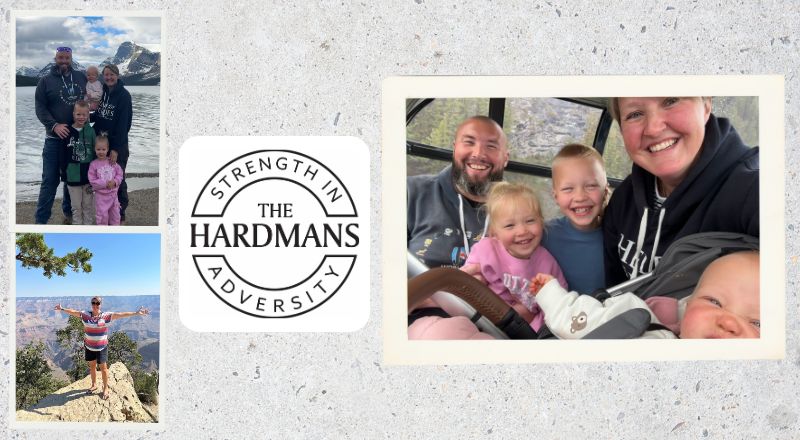
Heidi: Is there anything you would say to other women facing metastatic breast cancer?
Kate: I think most people would go with ‘don't give up’, which is a big one.
What's worked for me is to take every step, one at a time. Don't try and look too far ahead and worry about the future. You can only deal with what's in front of you. I’m very much: This is what I have to deal with. I will deal with this now. Then we go on to the next step.
I've got my scans coming up, so when my scans come, I will do that.
Then you'll have the wait for results and then you go to the next thing.
But I don't wonder what my scans might come back with or what if that happens? Because it does not help. Just take it step by step, deal with what's in front of you at that time. Move together with your support system, whether that's your extended family or friends, but get that support network around you.
Speak to people in the same situations. Find the (support) groups, whether that's online or wherever. People that know what you're going through. Although you'll have friends and family that you can talk to, nobody knows (exactly) what you're going through unless they've been through it too.
You can learn more about Kate & her family on their Facebook or Instagram pages
Images supplied by Kate Hardman





